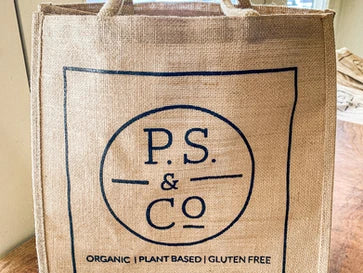Sustainability is a real buzzword at the moment. With the shift in the consumer marketplace toward a more eco-friendly future, we are here for it! You really can’t go anywhere without coming across this word and other related “green-forward” descriptions. When the pandemic hit last year, we witnessed Mother Nature go through a healing process as we’ve never seen before. Waterways cleared and wildlife showed up in places they hadn’t been able to travel to in years due to pollution and other man-made barriers. The air quality changed drastically, and we got to see what it was like when the hustle and bustle of our everyday lives slowed down. With changes like this, companies from all different sectors came out of the woodwork with “green” plans for their businesses. Cleaning products, packaging, furniture, apparel, footwear, food and beverages, beauty products, stationery...you name it, it’s probably out there. If you are in the health and wellness community or community adjacent, sustainability is most likely hammered into your everyday life.
What is Sustainability?
sus·tain·a·ble səˈstānəb(ə)l/ adjective
-
The ability to be maintained at a certain rate or level.
-
Avoidance of the depletion of natural resources in order to maintain an ecological balance.
Yoga Attire and Athletic Gear
Clothing companies have grasped onto the sustainability trend and more specifically, we’ve seen a huge surge in athletic gear, athleisure, and yoga attire. Different companies can contribute to sustainability efforts in a variety of ways. For instance, Patagonia, who’s always had an eco-friendly mission, gives back 1% of all sales to environmental conservation. They have been doing this for 35 years, whether or not they were profitable. Other ways people have been making a difference are through thrifting and consignment shopping. Let’s start with the manufacturing processes. Each time a run of clothing is made, trimmings, textiles, hardware, etc. goes to waste which adds up quickly. About 35% of supply chain materials go unused. With the rise in fast fashion on the market, there is a quick factory to supplier to customer turnarounds. This causes inexpensive and poor-quality purchases that don’t tend to last, therefore making their way to landfills. In fact, 57% of discarded clothing will end up there. There is a huge online market through platforms such as Poshmark, Depop, and threadUP. Yoga clothing is incredibly popular throughout these sites. You might be able to find cult favorites - Lululemon Aligns or Alo Motos secondhand, worn or not. Lastly, a very popular way to manufacture sustainable clothing is through clean, plant-based, or recycled methods. What does this mean exactly? More and more athletic clothing companies are using recycled cotton, plastics, and organic non-toxic fabrics. One of our favorites, Groceries Apparel uses the non-toxic and recycled approach. They use dyes pulled directly from plants You can actually shop by ingredient; meaning your purchase could be made from hemp or eucalyptus and dyed with carrot tops, coffee grounds, pomegranate, or weld flowers. How cool is that?!
Greenwashing
Greenwashing is a term that has gained popularity in recent years. Companies of all sorts have made vague and unrealistic promises to provide a greener and more sustainable product. How does one do this exactly? This can vary from promising to go plastic-free down the line but might not show any improvements in doing so. Products may also package their items with trees, flowers, and other nature-derived illustrations to grasp a consumer’s attention. Verbiage such as “natural,” “organic,” or “clean,” can also be misconstrued from what the actual product has to hold. Unfortunately, we as consumers have to spend a little extra time doing the research. This may include checking food labels for clean, organic ingredients or cleaning products for non-toxic ingredients. Try to seek out your local organic farmer’s markets for produce. Visit consignment shops to find second-hand pieces or sell/trade your unwanted garments. Check out a clothing company’s mission statement and the factory processes they use to ensure their ethical practices. There are so many positive changes happening within the sustainability world but it is important to beware of companies that may not have your best interest at heart. Also, on a local level, try and see where your city’s sanitation department stands in terms of recycling and commercial composting. It’s important to know if your waste is going to the correct places and understanding your options to help contribute to a greener future.
Our Own Mission

Here at P.S. & Co., we charge $0.50 per to-go order for our packaging. 100% of the sales from these charges goes towards an animal rescue that we switch up monthly. Another great way to contribute to these monthly rescues is to purchase one of our branded jute tote bags. 20% of each sale is donated! We pride ourselves on the highest quality, organic plant-based ingredients. Our recipes are house-made by our skilled team that is mindful of seasonality and repurposing ingredients. To keep waste down, we create recipes such as the Organic Mineral Vegetable Broth that is made with vegetable cuttings. We also work with local farmers to keep travel time down and decrease our carbon footprint.

Question of the week: Would you be happy to see us bring back our reusable glass bottles to P.S. & Co.? For a small charge, we used to have glass bottles for our juice and smoothie options. As for hot beverages, the guest would have the option to bring their own thermos in to save on packaging. We would love to hear your thoughts! Shoot us an email or DM on Instagram (@psandco).
https://growensemble.com/environmentally-friendly-companies/
https://www.onepercentfortheplanet.org/
https://www.commonobjective.co/article/fashion-and-waste-an-uneasy-relationship





Leave a comment
This site is protected by hCaptcha and the hCaptcha Privacy Policy and Terms of Service apply.